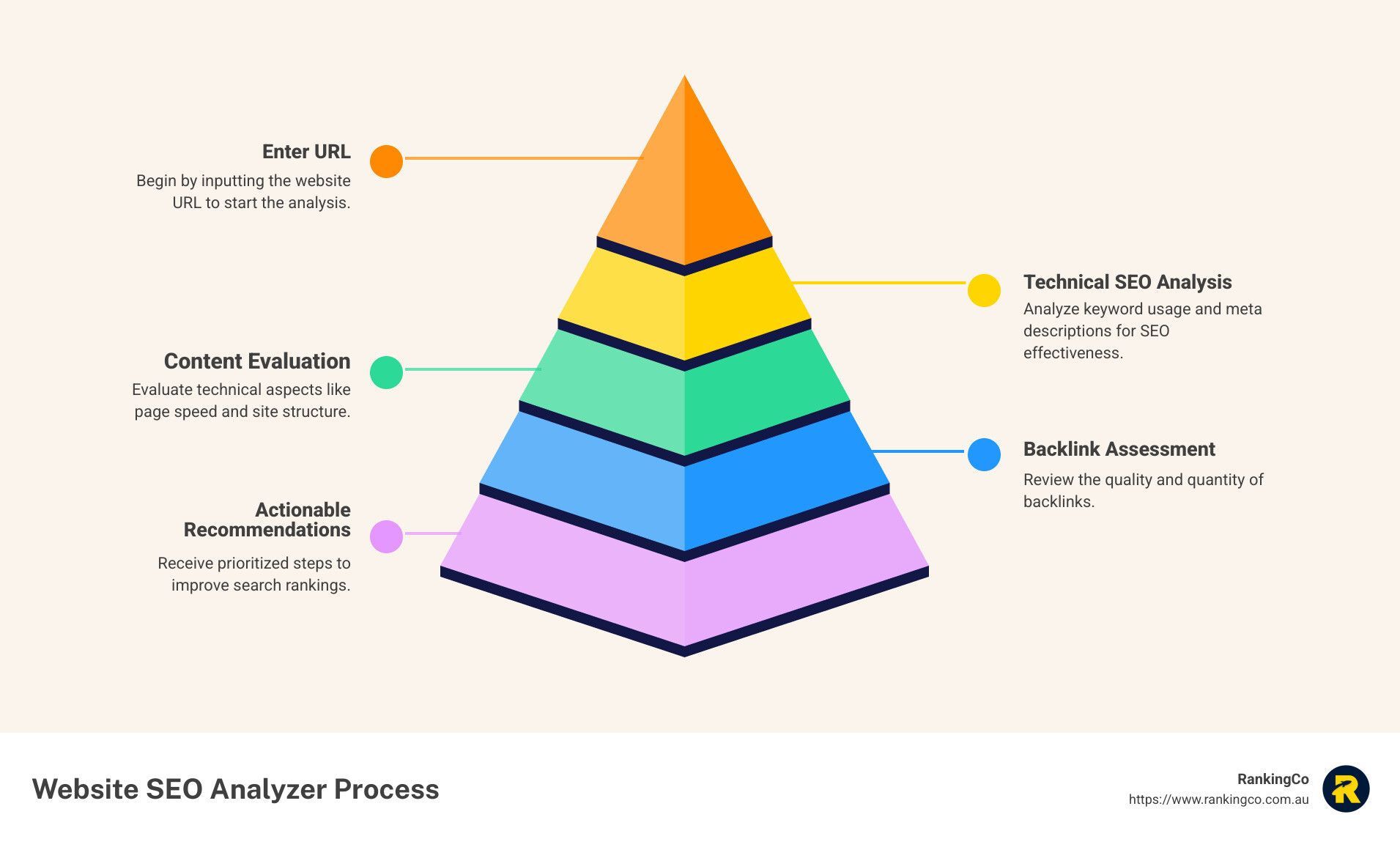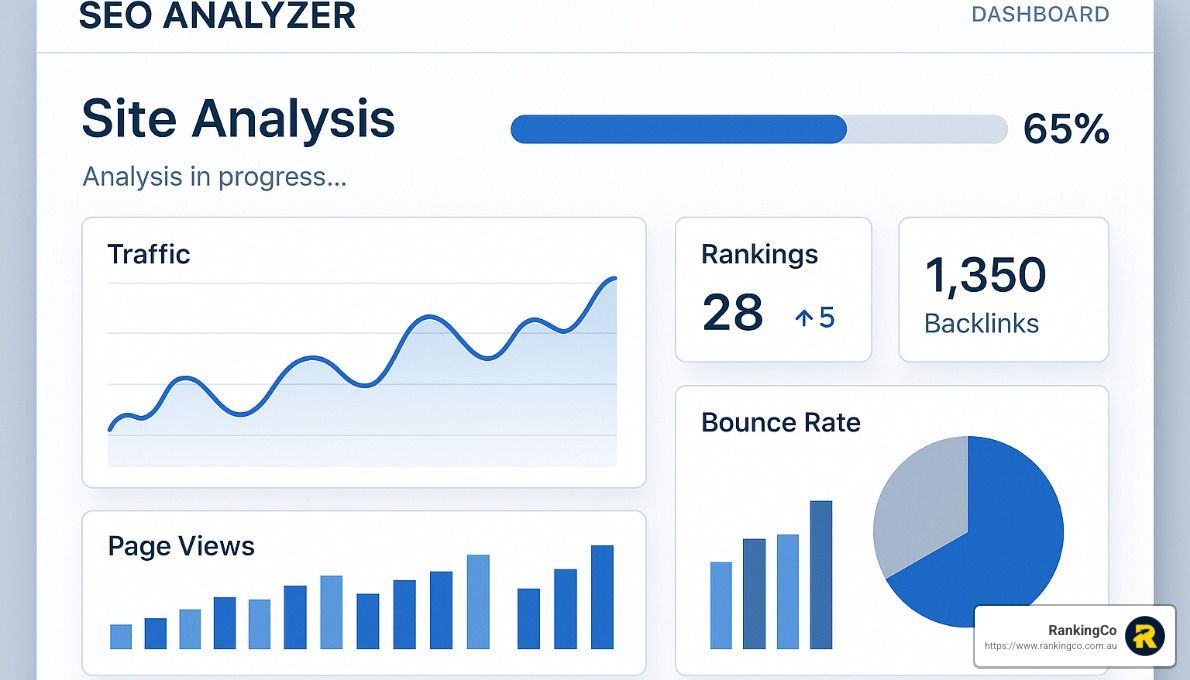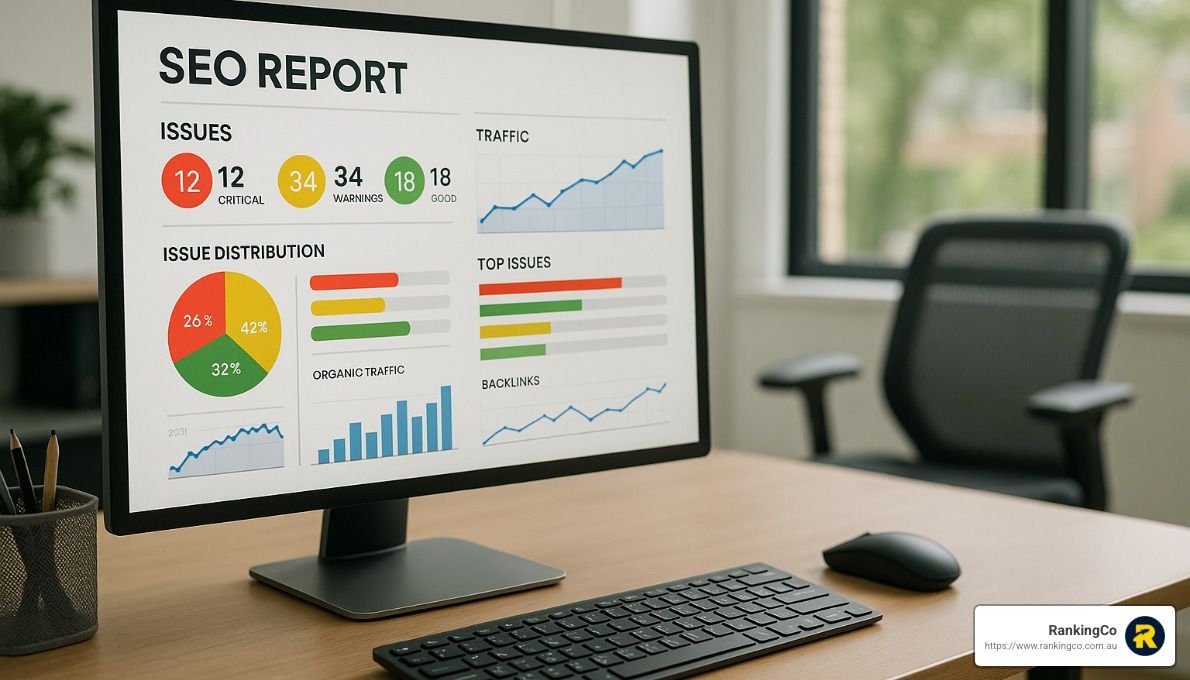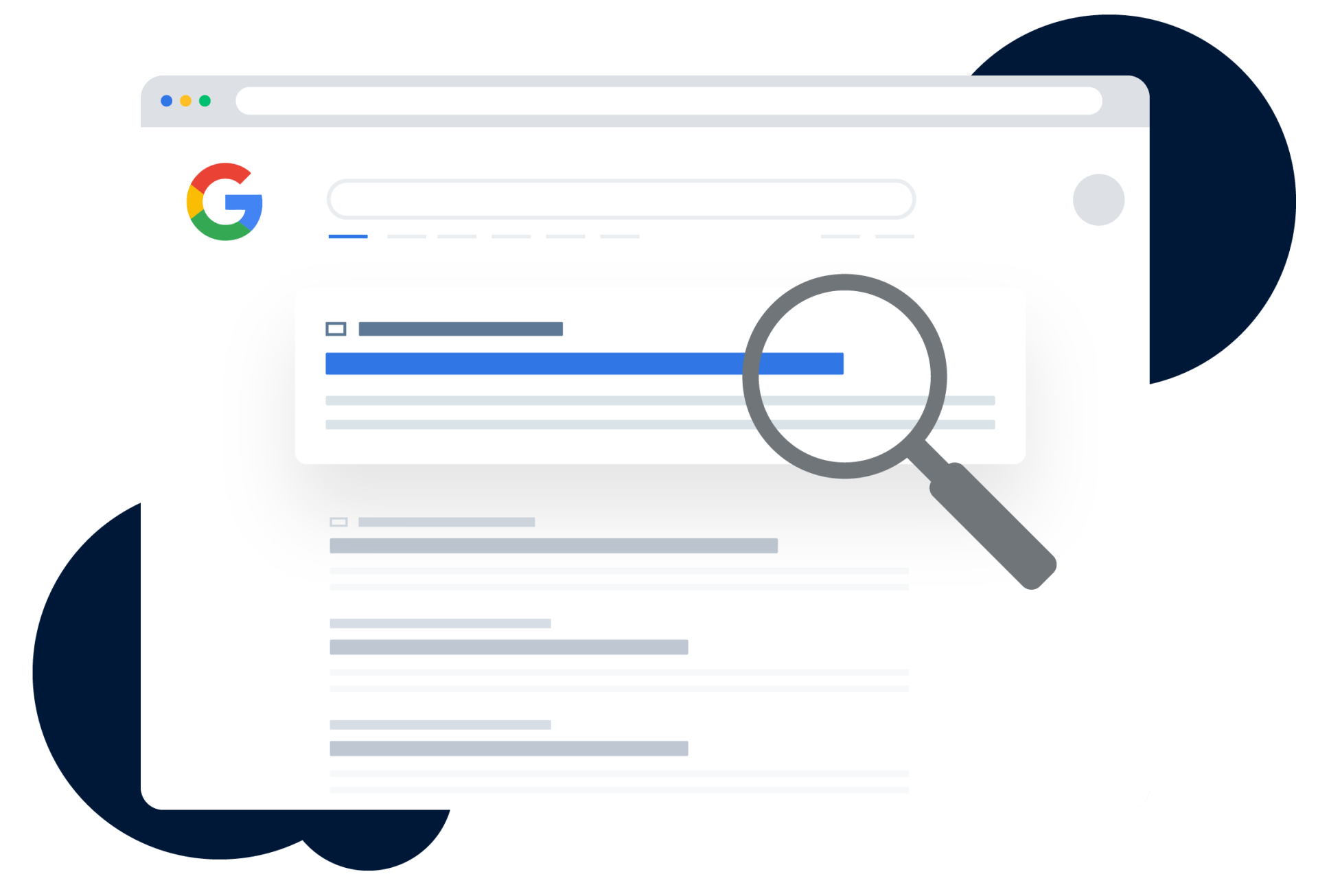SEO Analyzer Tools: How to Audit Your Website's Performance
Why Website SEO Analyzers Are Essential for Your Online Success
A website SEO analyzer is a tool that scans your website to evaluate its search engine optimisation performance and identify areas for improvement. If you're looking to analyse your website's SEO in 2025, here's what you need to know:
What is a Website SEO Analyzer? A diagnostic tool that evaluates your website's SEO performance Checks technical elements, content quality, backlinks, and more Provides actionable recommendations to improve search rankings Scores your site against SEO best practices Most analyzers check 100+ SEO factors in a single scan
In today's competitive digital landscape, your website's visibility in search results can make or break your business. A comprehensive website SEO analyzer helps you understand why your site might not be performing as well as it could be. These powerful tools examine everything from technical issues like broken links and slow page speeds to content-related factors such as keyword usage and meta descriptions.
According to research from Search Engine Journal, 75% of online users never explore beyond the first page of search results. This stark reality highlights the critical importance of optimising your website to appear on that coveted first page.
"SEO audits are a critical part of what we do. They not only help us understand your business and website but also enable us to tap into your website's potential and attain higher rankings in search engines," explains a leading SEO expert.
The average website SEO analyzer can uncover issues that might be invisible to the naked eye but are glaringly obvious to search engines. Users who regularly audit their websites with these tools see an average SEO traffic increase of 42% within just two months.
I'm Amber Porter, co-founder of RankingCo, and I've helped hundreds of businesses improve their online visibility using website SEO analyzers to uncover hidden opportunities and technical issues holding them back from ranking success.

What Is a Website SEO Analyzer?
A website SEO analyzer is like having a health check-up for your website – but instead of measuring your blood pressure, it examines how well your site meets search engine guidelines. These powerful tools dive deep into your website's performance, looking at everything from technical foundations to content quality.
When you use a website SEO analyzer, it crawls through your website much like Google or Bing would, examining over 100 different SEO factors. It's like having a search engine expert look under the hood of your website and point out exactly what needs fixing.
A comprehensive analyzer will assess your website across multiple dimensions – checking your technical setup, evaluating your content quality, examining meta information, testing mobile-friendliness, measuring site speed, analyzing your backlinks, and seeing how you stack up against competitors.
The beauty of these tools is that they don't just identify problems – they give you a roadmap for improvement. With these insights, you can make targeted changes that actually move the needle on your search rankings.
Understanding SEO Analyzer Tools
When you run a website SEO analyzer, it springs into action in several important ways. First, it crawls your website by following links and examining your site structure – much like a search engine would. This gives you insight into what search engines actually see when they visit your site.
The analyzer then digs into your technical elements – finding broken links, redirect chains, missing alt text, and other technical issues that might be holding you back. These technical problems can be invisible to the naked eye but glaringly obvious to search engines.
Beyond the technical aspects, these tools evaluate your content quality too. They look at keyword usage, readability, and relevance to help determine if your content is hitting the mark. After all, even the most technically perfect website won't rank well with poor content!
Modern analyzers don't stop there – they also assess user experience factors like mobile-friendliness and page load times. These elements are increasingly important in today's SEO landscape, where user experience signals directly impact rankings.
After gathering all this information, the tool compiles everything into an easy-to-understand report. Most website SEO analyzers use a scoring system, starting with a perfect 100 points and subtracting for each issue found. This helps you quickly identify which problems are most critical to address.
Benefits of Using a Website SEO Analyzer
Using a website SEO analyzer regularly brings numerous advantages beyond just improving your search rankings. For starters, it takes the guesswork out of SEO by providing concrete data about specific issues needing attention.
One of the most valuable benefits is getting prioritised recommendations. Instead of feeling overwhelmed by a long list of potential issues, good analyzers help you understand which problems to tackle first based on their impact on your rankings. This means you can focus your efforts where they'll make the biggest difference.
Many SEO analyzers also offer competitive insights, allowing you to see how your site compares to others in your industry. This can reveal opportunities you might otherwise miss and help you understand where you need to step up your game.
"An SEO audit is essential before progressing with an SEO campaign to ensure that weaknesses are identified and addressed." This sentiment from SEO experts highlights how fundamental analysis is to any successful optimisation strategy.
The time-saving aspect shouldn't be overlooked either. Instead of manually checking hundreds of potential issues (which would take days or weeks), an analyzer can identify problems in minutes. For busy business owners, this efficiency is priceless.
At RankingCo, we've witnessed Brisbane businesses completely transform their online presence through regular SEO audits. Some of our clients have seen dramatic improvements in organic traffic within just a few months of implementing our analyzer recommendations. By addressing technical issues first and then focusing on content optimisation, these businesses have achieved lasting SEO success.
Regular analysis also helps you stay ahead of the curve. Search engines constantly update their algorithms, and what worked yesterday might not work tomorrow. By continuously monitoring your site's performance, you can quickly adapt to changes and maintain your competitive edge.
Why Auditing Your Website's SEO Performance Is Crucial
In the rapidly evolving digital world of 2025, keeping tabs on your website's SEO performance isn't just a nice-to-have—it's absolutely essential. Google tweaks its algorithm roughly 600 times each year (that's nearly twice daily!), which means what worked brilliantly last month might be hurting your rankings today.
Think of your website as a car that needs regular servicing. You wouldn't wait until your engine fails to get it checked, right? The same principle applies to your website's SEO health. Regular audits using a website SEO analyzer help you spot issues before they become serious problems that tank your rankings.
What makes this particularly important is that your competitors aren't standing still. They're likely using similar tools to fine-tune their websites and edge ahead in search results. Meanwhile, today's web users have increasingly high expectations—they want fast-loading pages, mobile-friendly designs, and intuitive navigation. If your site falls short, they'll bounce faster than you can say "lost customer."
Content freshness matters too. Search engines love updated, relevant content that answers users' questions. An SEO audit can highlight which pages need a refresh or expansion to maintain their ranking power.
At RankingCo, we've seen businesses transform their online presence after addressing issues uncovered through comprehensive SEO audits. One Brisbane client found their site had been unknowingly penalised for duplicate content across multiple domains—a problem they'd never have identified without proper analysis.
Identifying Technical Issues Early
The technical foundation of your website can make or break your SEO success. Technical issues are particularly troublesome because they often affect your entire site rather than just individual pages—like having a crack in your home's foundation rather than just a squeaky door.
A good website SEO analyzer acts like a detective, uncovering hidden technical problems that might be invisible to the naked eye but are glaringly obvious to search engines. These issues can include crawl errors where search engines can't access certain pages, broken links that lead to frustrating dead ends, or redirect chains that slow down both users and search engine bots.
Duplicate content is another common culprit. You might not realise that your product pages are accessible through multiple URLs, essentially competing against themselves in search results. Poor site architecture can leave important pages buried too deep for search engines to find them, while server configuration issues might be telling Google not to index your content at all!
Page speed is particularly crucial—studies from Google's Web.dev show that 53% of mobile users abandon sites that take longer than three seconds to load. That's a lot of potential customers lost over a few seconds.
"Technical SEO is the foundation upon which all other SEO efforts are built. If your foundation is weak, everything else will collapse," explains our technical SEO team at RankingCo. We've seen countless businesses experience dramatic ranking improvements after fixing critical technical issues identified through our Technical SEO analysis.
Enhancing User Experience for Better Rankings
Search engines have become increasingly sophisticated in measuring how users interact with your website. Google doesn't just want to send people to pages that match their search terms—it wants to send them to pages they'll actually enjoy using.
A comprehensive website SEO analyzer evaluates key user experience factors that impact your rankings. Mobile responsiveness tops this list—with over 60% of searches now coming from mobile devices, Google prioritises mobile-friendly websites in its rankings.
Page load times aren't just a technical consideration; they're a crucial user experience factor. When we helped one local Brisbane café optimise their image sizes and implement browser caching, their page load time dropped from 8 seconds to under 2, and their organic traffic increased by 27% within a month.
Navigation structure matters too. Can users easily find what they're looking for? Is your content readable, with appropriate headings, short paragraphs, and clear language? Does your page layout stay stable as elements load, or do buttons shift just as users try to click them (a frustrating experience known as Cumulative Layout Shift)?
Google's Core Web Vitals have formalised these user experience metrics as ranking factors. They measure loading performance, interactivity, and visual stability—and sites that perform well on these metrics often see significant ranking boosts.
At RankingCo, we've witnessed the power of user experience improvements firsthand. One of our Onsite SEO clients saw their organic traffic increase by over 30% after implementing recommendations from our website SEO analyzer. The changes weren't even particularly complex—optimising images, implementing lazy loading, and restructuring their mobile navigation made all the difference.
Search engines are ultimately trying to satisfy users. When you create a better experience for real people, search engines notice—and reward you accordingly.
Key Features of Effective SEO Analyzer Tools
When you're looking for a website SEO analyzer that truly delivers results, not just any tool will do. The digital landscape is constantly evolving, and your SEO tools need to keep pace. At RankingCo, we've tested dozens of analyzers over the years, and we've found that the most effective ones share several critical features.
A truly helpful website SEO analyzer combines comprehensive analysis capabilities with an interface that doesn't require a PhD in computer science to understand. The best tools provide clear, actionable recommendations rather than just pointing out problems and leaving you to figure out solutions on your own.
"What sets exceptional SEO analyzers apart is their ability to translate complex technical issues into straightforward action items," explains our senior SEO specialist. "You shouldn't need to be an SEO expert to understand what needs fixing on your website."
Another standout feature of top-tier analyzers is competitive analysis functionality. Being able to see how your site stacks up against competitors provides invaluable context for your optimization strategy. After all, SEO isn't just about following best practices—it's about outperforming the competition in your specific niche.
Look for tools that receive regular updates to reflect the latest search engine algorithm changes. SEO is never static, and your analyzer shouldn't be either. Integration capabilities with platforms like Google Analytics can also save you significant time by consolidating data from multiple sources.
Finally, don't underestimate the value of customisable reporting. Whether you're explaining SEO progress to a client, your boss, or using it for your own strategy planning, the ability to generate custom reports for different audiences is incredibly useful.
Technical SEO Analysis Capabilities
The foundation of any successful SEO strategy lies in solid technical implementation. A robust website SEO analyzer should thoroughly evaluate your site's technical health, identifying issues that might be invisible to the naked eye but glaringly obvious to search engines.
Crawlability assessment is perhaps the most fundamental technical check. If search engines can't properly crawl your site, nothing else matters—your content simply won't appear in search results. Good analyzers will identify crawl errors, blocked resources, and other issues that might prevent search engines from accessing your content.
Site architecture analysis is another crucial component. Is your internal linking structure logical? Does it help both users and search engines understand the relationship between different pages? A quality website SEO analyzer will evaluate your site's structure and suggest improvements.
HTTP header checking might sound technical (and it is), but it's incredibly important. Proper status codes and redirect implementation can make a huge difference in how search engines interpret your site. We've seen clients gain significant ranking improvements simply by fixing improper redirects identified through our Technical SEO audits.
"Technical SEO might not be as glamorous as content creation, but it's often where the biggest performance gains are hiding," notes our technical SEO lead. "I've seen sites jump dozens of ranking positions just by fixing critical technical issues that were holding them back."
Don't overlook the importance of structured data verification either. Properly implemented schema markup can help search engines better understand your content and can lead to improved search results with rich snippets, which typically attract higher click-through rates.
On-Page SEO Evaluation Functions
While technical SEO forms the foundation, on-page elements are what users (and search engines) actually see and interact with. A comprehensive website SEO analyzer should thoroughly evaluate these visible components.
Title tags and meta descriptions are your site's first impression in search results. Good analyzers will check if they're the optimal length, unique across your site, and effectively incorporating target keywords without appearing spammy.
Content quality assessment is perhaps the most nuanced aspect of on-page SEO evaluation. The best analyzers go beyond simple keyword density checks to evaluate comprehensiveness, readability, and overall value to users. Google's ultimate goal is to provide users with the most helpful content—your analyzer should help ensure your content meets that standard.
At RankingCo, our Onsite SEO services focus heavily on these on-page factors because they often provide the quickest wins for improving search visibility. We've helped countless Brisbane businesses transform their content from "just okay" to truly outstanding, with corresponding improvements in rankings and traffic.
Off-Page SEO Insights
What others say about you matters—both in life and in SEO. Off-page factors, particularly backlinks, remain among the most powerful ranking signals, and a quality website SEO analyzer should provide detailed insights into these external factors.
Your backlink profile—the quantity and quality of sites linking to yours—tells search engines a lot about your site's credibility and authority. Good analyzers will not just count your links but evaluate their quality, relevance, and naturalness. They'll flag potentially harmful links that might trigger Google penalties and identify opportunities for building valuable new connections.
Domain authority metrics give you a quick snapshot of how authoritative your site appears to search engines relative to competitors. While these metrics aren't direct ranking factors, they provide useful context for your overall SEO strategy.
Social signals and brand mentions, while not directly factored into rankings, can indirectly impact your SEO by increasing visibility and driving traffic. Advanced analyzers will track mentions of your brand across the web, even when they don't include links.
Perhaps most valuable is competitor backlink analysis. Seeing where your competitors are getting their links can reveal opportunities you might have missed. At RankingCo, we've helped clients find valuable linking opportunities by analyzing what's working for their successful competitors through our Get More Traffic strategies.
Customisation and Reporting Features
The insights from your website SEO analyzer are only valuable if you can understand them and turn them into action. That's why customisation and reporting features are so crucial—they transform raw data into strategic direction.
White-label reports are particularly important for agencies and consultants who need to present professional, branded analyses to clients. These reports should clearly communicate both problems and solutions without overwhelming non-technical stakeholders with jargon.
Data export options give you the flexibility to dig deeper into specific issues or combine SEO data with information from other sources. Whether you're creating custom reports in Excel or feeding data into another analysis tool, easy export functionality is invaluable.
Progress tracking capabilities help you see the impact of your optimization efforts over time. Has fixing those technical issues improved your crawl stats? Did updating your meta descriptions increase your click-through rates? The best analyzers make it easy to compare current results against previous audits.
Scheduled reports save you from having to manually run analyses at regular intervals. Set it up once, and your website SEO analyzer will automatically generate fresh reports daily, weekly, or monthly—whatever cadence works best for your SEO strategy.
At RankingCo, we combine powerful automated analysis with human expertise to ensure our clients don't just receive data—they receive insights they can actually use to improve their online presence. After all, the most sophisticated analysis in the world isn't helpful if you don't know what to do with it.
How to Use a Website SEO Analyzer to Audit Your Site
Getting started with a website SEO analyzer might seem daunting at first, but it's actually quite straightforward once you know the basics. Think of it as giving your website a thorough health check-up – one that reveals hidden issues and opportunities for growth.
Selecting the Right Website SEO Analyzer Tool
With dozens of SEO tools on the market, finding your perfect match requires a bit of consideration. It's like choosing a new car – you need one that fits your specific needs and skill level.
When we help clients at RankingCo, we always consider their unique circumstances before recommending a tool. Are you a small business owner with limited technical knowledge? You'll want something user-friendly with visual reports. Are you an experienced marketer? You might prefer something with more advanced features and customisation options.
Budget naturally plays a role in your decision. Free tools can provide a solid starting point, but they typically offer limited analysis depth. Paid options generally deliver more comprehensive insights and regular updates that keep pace with search engine changes.
Consider your specific challenges too. If your website is struggling with technical issues, prioritise tools with strong technical analysis capabilities. If content is your main concern, look for analyzers with robust content evaluation features.
Many of our clients at RankingCo find great value in tools that integrate with their existing systems. Being able to connect your SEO analyzer with Google Analytics or your content management system creates a more seamless workflow and provides richer context for your findings.
Check out our Onsite SEO page for more information about how we approach website analysis for our clients.
Running Your First Audit with a Website SEO Analyzer
Once you've chosen your tool, running your first audit is surprisingly simple:

First, enter your website URL into the analyzer's search bar. Some tools allow you to specify particular sections of your site if you want to focus on specific areas rather than conducting a full-site audit.
Next, you'll typically have options to customise your analysis parameters. This might include setting crawl limits (how many pages to analyze), excluding certain sections, or focusing on specific types of issues. If you're new to SEO auditing, the default settings are usually a good starting point.
When you're ready, start the scan and let the tool work its magic. Depending on your website's size and the depth of analysis, this could take anywhere from a few minutes to several hours. Larger sites with thousands of pages naturally take longer to analyze thoroughly.
Once complete, you'll see an initial results dashboard that typically includes an overall SEO health score and highlights the most pressing issues. This overview gives you a quick sense of your site's SEO condition and where major problems might exist.
I always recommend clients take time to explore the detailed findings beyond this initial summary. Dig into specific categories like technical issues, on-page factors, and backlink analysis to understand the full picture of your site's performance.
Before you close the tool, be sure to save or export your report. This first audit establishes your baseline – you'll want to refer back to it later to measure your progress as you make improvements.
Interpreting the SEO Report
Understanding your SEO audit results is where many people get stuck – but it doesn't have to be complicated:

Start by looking at your overall SEO score. This gives you a general sense of your site's health. In our experience at RankingCo, scores above 80% typically indicate solid optimisation, while anything below 50% suggests significant room for improvement. Scores under 30% usually mean there are fundamental issues that need immediate attention.
Next, focus on critical errors first. Most analyzers categorise issues by severity, using terms like "critical," "warning," and "notice." The critical issues are those having the most significant impact on your rankings and user experience – things like broken pages, missing mobile optimisation, or severe speed problems.
Look for patterns in the results. Are there recurring issues across multiple pages? We often find that websites have systematic problems that affect many pages – like missing meta descriptions or improperly sized images. Addressing these pattern issues can lead to substantial improvements with relatively focused effort.
Always consider the context of your specific business and audience. For example, if 80% of your traffic comes from mobile devices, mobile optimisation issues should take priority over other concerns that might be technically "critical" but less relevant to your specific situation.
If your analyzer offers competitive analysis, take advantage of this feature to see how your site compares to others in your industry. This context can help you understand whether certain metrics are typical for your sector or represent genuine competitive disadvantages.
Finally, develop a prioritised action plan based on your analysis. We recommend ranking improvements by a combination of potential impact and ease of implementation. This approach helps you tackle the "low-hanging fruit" – high-impact, easy-to-fix issues – while planning for more complex changes that might require additional resources or expertise.
At RankingCo, we guide our clients through this interpretation process, helping them understand not just what issues exist, but why they matter for their specific business goals. This context is crucial for making smart decisions about where to invest your SEO resources for maximum return.
If you're feeling overwhelmed by your SEO audit results, our Technical SEO team can help you make sense of the data and develop a practical plan for improvement. We believe that SEO analysis should lead to clear, actionable steps – not confusion or analysis paralysis.
Interpreting Results and Prioritising SEO Improvements
After running your website SEO analyzer audit, you'll likely find yourself staring at a lengthy list of potential improvements. Don't panic! This is completely normal, and the key to success isn't fixing everything at once—it's knowing what to tackle first.
Think of your SEO improvements like renovating a house. You wouldn't start painting walls if the foundation was cracking, right? Similarly, some SEO issues are foundational and need immediate attention, while others can wait for your second round of improvements.
At RankingCo, we've helped countless Australian businesses make sense of their SEO audit results. One Brisbane service business we worked with felt overwhelmed by their initial audit findings, but by helping them prioritise effectively, they achieved a remarkable 72% increase in organic traffic. Here's the approach we recommend:
Focus on critical errors first. These are the issues preventing search engines from properly crawling and indexing your site—essentially, if Google can't see your content, nothing else matters.
Look for those quick wins. Some fixes take just minutes but can dramatically improve your rankings. These low-hanging fruit should be near the top of your priority list.
Align improvements with your business goals. If you're primarily focused on generating leads, prioritise fixing issues on your conversion-focused pages first. Running an ecommerce store? Your product pages deserve immediate attention.
Balance technical fixes with content improvements. While technical issues often provide the foundation for SEO success, compelling content is what ultimately attracts and engages your audience.
Create a phased, realistic timeline. Rome wasn't built in a day, and your SEO won't be fixed overnight. Break your improvements into manageable phases rather than trying to tackle everything at once.
The beauty of this phased approach is that you'll start seeing improvements quickly, which can provide the motivation to keep going with the more complex fixes.
Addressing Technical SEO Issues First
Technical SEO issues are like having a sports car with engine problems—no matter how beautiful it looks, it simply won't perform. Here are the most common technical issues our website SEO analyzer typically identifies:
Broken links and 404 errors create a frustrating experience for visitors and waste your precious crawl budget. These should be among the first issues you address.
Duplicate content confuses search engines about which version of your content to rank. This is particularly common on ecommerce sites where similar products may have very similar descriptions.
Crawl errors prevent search engines from accessing your content altogether—if they can't crawl it, they can't rank it.
Site speed problems aren't just annoying for users (though they certainly are that); they're also a direct ranking factor. Even a one-second delay in page load time can significantly impact your conversion rates.
Mobile usability issues have become increasingly important since Google's shift to mobile-first indexing. If your site doesn't work well on mobile devices, your rankings will suffer across the board.
When tackling technical issues, start with those that affect the largest number of pages or have the most significant impact on user experience. In our experience at RankingCo, site speed is consistently one of the most common issues affecting Australian businesses.
The good news? Simple optimisations like compressing images, implementing browser caching, and minifying CSS and JavaScript files can lead to dramatic improvements in both user experience and search rankings.
Our Technical SEO specialists are experts at identifying and resolving these foundation-level issues that might be holding your site back.
Optimising Content for Search Engines
Once your technical foundation is solid, it's time to turn your attention to what your visitors actually came for—your content. Your website SEO analyzer will likely highlight several content-related issues:
Thin content pages simply don't provide enough valuable information to satisfy user queries or demonstrate expertise to search engines. Google's helpful content update has made robust, valuable content more important than ever.
Duplicate content issues aren't just technical problems—they often stem from content that's too similar across multiple pages. This is particularly common with product descriptions in ecommerce stores.
Keyword optimisation issues often show up in missing or poorly optimised title tags, meta descriptions, and headings. These elements tell search engines what your content is about, so getting them right is crucial.
Readability problems can drive visitors away even if they do find your site. Content that's difficult to read or understand won't keep visitors engaged—or convince them to become customers.
Structured data opportunities are often missed, yet implementing schema markup can dramatically improve how your content appears in search results, potentially increasing your click-through rates.
I remember working with an ecommerce client whose product descriptions were virtually identical across dozens of similar products. By rewriting these descriptions to be unique, detailed, and genuinely helpful, they saw a 45% increase in organic traffic to their product pages within just three months. That's the power of thoughtful content optimisation!
At RankingCo, our SEO Content Writing services focus on creating content that not only ranks well but also converts visitors into customers. After all, traffic without conversions is just a vanity metric.
Building a Strong Backlink Profile
While you're working on your on-site optimisations, don't forget about the powerful off-site factor: backlinks. They remain one of Google's most important ranking signals, but quality matters far more than quantity.
Your website SEO analyzer will evaluate your backlink profile for several common issues:
Low-quality or spammy backlinks can actually harm your rankings rather than help them. Links from irrelevant, low-authority sites send negative signals to search engines about your site's credibility.
Over-optimised anchor text is a red flag to search engines. When too many of your backlinks use exact-match keyword phrases as anchor text, it looks unnatural and can trigger spam filters.
Lack of diversity in your backlink sources can limit your ranking potential. A natural backlink profile includes links from various types of websites, not just a few sources.
Missing opportunities often become apparent when you analyse your competitors' backlinks. If they're getting valuable links that you could also acquire, that's a clear opportunity for improvement.
Building a strong backlink profile is generally a longer-term strategy than fixing technical or content issues, but it's essential for sustainable SEO success. Think of backlinks as votes of confidence from other websites—the more reputable the sites linking to you, the more trustworthy Google considers your content.
At RankingCo, we help our clients Get More Traffic by developing strategic approaches to earning high-quality backlinks from relevant, authoritative sites in their industry. Rather than using outdated tactics that could get your site penalised, we focus on creating genuine relationships and valuable content that naturally attracts links.
SEO improvement isn't a one-time project—it's an ongoing process. The digital landscape and search algorithms are constantly evolving, which means your optimisation strategy needs to evolve too. Regular audits with a reliable website SEO analyzer will help you stay ahead of the curve and maintain your hard-won rankings.
Best Practices for Ongoing SEO Analysis
SEO isn't a set-and-forget activity – it's an ongoing journey that requires regular attention and fine-tuning. Think of your website as a garden that needs consistent care to flourish. Let's explore how you can use a website SEO analyzer as part of your long-term strategy to keep your digital presence thriving.
Scheduling Regular SEO Audits
Just as you'd schedule regular health check-ups, your website needs routine examinations to stay in peak condition. Here's how to approach this:
Quarterly comprehensive audits work well for most businesses, giving you enough time to implement changes while catching issues before they become serious problems. For larger or more complex websites, you might want to increase the frequency to monthly check-ups.
"We've found that clients who commit to regular audits see much more consistent growth than those who take a reactive approach," says Amber Porter, co-founder of RankingCo. "It's about building SEO maintenance into your regular business operations."
Between full audits, consider running focused checks on specific aspects of your site. For instance, after publishing new content, run a quick analysis to ensure it meets SEO best practices. Similarly, after making significant technical changes to your site, it's wise to check that no new issues have been introduced.
Many of our Brisbane clients have acceptd automation for these routine checks. Most good website SEO analyzer tools offer scheduling features that can generate reports automatically at regular intervals, saving you time and ensuring consistency.
Combining SEO Analyzer Insights with Analytics Data
Your website SEO analyzer provides valuable insights into what's happening behind the scenes, but it's only telling half the story. To get the complete picture, you need to combine these technical insights with real-world performance data.
Google Analytics shows you how users are actually interacting with your site. Are they finding what they need? How long do they stay? Which pages engage them most? Meanwhile, Google Search Console reveals which queries are bringing visitors to your site and how your pages are performing in search results.
By connecting these dots, you can identify fascinating patterns. For example, you might find that pages with technical issues flagged by your SEO analyzer also have higher bounce rates in Analytics. Or you might find that fixing certain SEO issues leads to immediate improvements in click-through rates from search results.
One of our eCommerce clients noticed that product pages with optimised meta descriptions (as recommended by their website SEO analyzer) had click-through rates nearly 25% higher than those with generic descriptions. This insight helped them prioritise which optimisation tasks would deliver the biggest bang for their buck.
Rankings aren't everything. A page might rank well but still not convert visitors if the content doesn't meet their needs. By examining both SEO metrics and user behaviour data, you can create a strategy that not only attracts visitors but also engages them once they arrive.
Leveraging Advanced Technologies for SEO
The SEO landscape is evolving rapidly, with artificial intelligence and machine learning changing how we approach optimisation. Modern website SEO analyzer tools are increasingly incorporating these advanced technologies to provide deeper insights.
AI-powered analysis can now identify subtle patterns across thousands of data points – connections that might be invisible to the human eye. These tools can predict which optimisations will have the biggest impact based on historical performance data, helping you prioritise your efforts more effectively.
Natural Language Processing (NLP) is another game-changer. Rather than simply counting keywords, NLP helps analyze content quality and relevance from a semantic perspective, much like how modern search engines evaluate content. This means you can focus on creating genuinely valuable content rather than worrying about exact keyword density.
"RankingCo integrates advanced AI technologies to improve the efficacy of their digital marketing strategies, allowing them to analyse market trends accurately and create effective campaigns for their clients." This technological edge ensures we stay ahead of rapid changes in the digital landscape and deliver consistently outstanding results.
One particularly exciting development is predictive analytics, which can forecast the potential impact of different optimisation strategies. This allows you to make more informed decisions about where to invest your SEO resources for maximum return.
The businesses that thrive in today's competitive search landscape aren't necessarily those with the biggest budgets, but those who approach SEO with intelligence, consistency, and adaptability. By combining regular audits with analytics insights and leveraging advanced technologies, you can build a sustainable SEO strategy that delivers long-term growth for your business.
SEO success isn't about quick fixes or overnight results – it's about building a strong foundation and continuously refining your approach based on data and insights. With the right tools and a commitment to ongoing improvement, you can achieve and maintain strong search visibility in even the most competitive markets.
Frequently Asked Questions About Website SEO Analyzers
What Is an SEO Score and How Is It Calculated?
If you've ever run a website SEO analyzer tool, you've likely seen that mysterious number at the top of your report – the SEO score. But what exactly does this number mean?
Think of your SEO score as a report card for your website's search engine optimisation. Most analyzers start with a perfect score (typically 100 points) and then subtract points for each issue they find during the analysis. The more serious the problem, the more points get deducted.
"I always tell our clients that the score itself isn't as important as understanding what's behind it," explains our SEO specialist at RankingCo. "It's the specific issues that matter, not just the number."
Generally speaking, a score above 80% suggests your site is in good shape, while scores between 50-80% indicate room for improvement. If you're below 50%, your site likely has significant issues that need addressing promptly.
SEO scores vary between different tools – what might be a 65 on one analyzer could be a 75 on another. What truly matters is tracking how your score changes over time as you make improvements, rather than obsessing over the absolute number.
How Can I Improve My SEO Score After an Audit?
Improving your SEO score isn't about quick fixes – it requires a methodical approach to addressing the issues your website SEO analyzer has identified.
Start with the critical issues first. These are typically technical problems that prevent search engines from properly crawling and indexing your site. Without fixing these foundation issues, other improvements won't have much impact.
Once your technical foundation is solid, turn your attention to on-page elements. This includes optimising your title tags, meta descriptions, headings, and content to align with both user intent and search engine best practices.
Next, focus on user experience factors like site speed, mobile-friendliness, and intuitive navigation. Google increasingly uses these signals to determine rankings, as they directly impact how users interact with your site.
Building quality backlinks should be a parallel, ongoing effort. While this typically takes longer than other optimisations, a strong backlink profile remains one of the most powerful ranking factors.
The key to sustainable improvement is integrating SEO best practices into your regular workflows. At RankingCo, we've helped numerous Brisbane businesses transform their approach to content creation and website management, resulting in steady, long-term SEO growth rather than temporary gains.
"SEO isn't something you do once and forget about," notes our head of SEO. "The most successful businesses weave SEO considerations into everything they publish online."
Do I Need to Run Regular Audits with a Website SEO Analyzer?
Absolutely! Regular SEO audits aren't just recommended – they're essential for maintaining and improving your search performance over time. Here's why:
Search engines are constantly evolving. Google makes hundreds of algorithm updates each year, some small and some significant enough to completely reshape the SEO landscape. What worked brilliantly last year might be ineffective or even harmful today.
Your website is always changing too. Every time you add new content, update a page, or modify your site structure, you potentially introduce new SEO issues that need addressing. Without regular checks, these problems can accumulate and eventually impact your rankings.
Meanwhile, your competitors aren't standing still. They're likely working to improve their SEO continuously, which means maintaining the status quo actually means falling behind in relative terms.
"One of our clients initially questioned the need for quarterly audits," shares our digital strategy director at RankingCo. "Six months later, after seeing how quickly new issues emerged on their rapidly-growing site, they actually requested we increase the frequency to monthly checks."
For most businesses, we recommend comprehensive audits quarterly and focused technical checks monthly. However, the ideal frequency depends on factors like your site's size, how often it changes, and how competitive your industry is.
By incorporating regular website SEO analyzer audits into your digital strategy, you'll stay ahead of issues before they impact your rankings and keep pace with the ever-changing SEO landscape. At RankingCo, this proactive approach forms the cornerstone of how we help businesses maintain their competitive edge in search results.
Open up Your Potential – Get Ranking with RankingCo
A website SEO analyzer is more than just a diagnostic tool—it's your window into understanding what's holding your website back from achieving its full potential in search results. While these analyzers provide valuable insights, turning those insights into meaningful improvements requires both expertise and strategic thinking.
At RankingCo, we understand that effective SEO isn't about quick fixes or temporary ranking boosts. It's about building a solid foundation for sustainable growth that continues to deliver results long after the initial optimisation work is complete.
Our Brisbane-based team combines powerful SEO analysis tools with years of practical experience to develop customised strategies that align perfectly with your business goals. We don't just hand you a report full of technical jargon—we work with you to interpret the findings and implement changes that will have the greatest impact on your bottom line.
"When we partner with a client, we're looking to build a relationship that delivers long-term value," explains our head of SEO. "That means digging deeper than surface-level metrics to truly understand what makes their audience tick and how we can connect them with that audience through search."
What sets our approach apart is our commitment to holistic SEO. While a website SEO analyzer might identify technical issues, content gaps, or backlink opportunities, we see these elements as interconnected parts of a larger strategy. Our comprehensive SEO services address all aspects of search optimisation, from technical foundations to content creation and link building.
For small businesses in particular, local SEO can be a game-changer. We've helped countless Brisbane companies improve their visibility in local search results, connecting them with customers right in their neighbourhood who are actively looking for their products or services.
The digital marketing landscape is constantly evolving, with search engines updating their algorithms hundreds of times each year. Our team stays at the forefront of these changes, continuously refining our approach to ensure your website maintains and improves its position in search results over time.
Ready to find what's possible when you combine powerful SEO analysis with expert implementation? Contact our friendly team today to schedule a consultation. We'll show you exactly how our data-driven approach can transform your online presence and help you connect with more customers across Brisbane and beyond.
Your journey to better search visibility starts with understanding where you stand today. Let RankingCo be your guide to open uping the full potential of your website and achieving sustainable organic growth.















